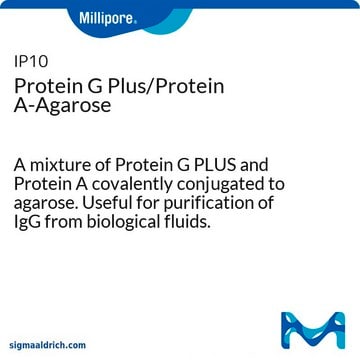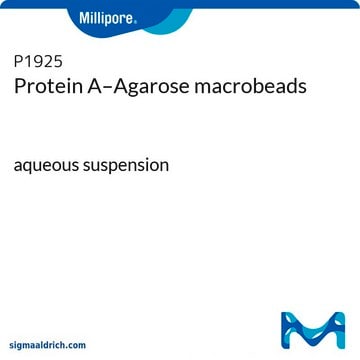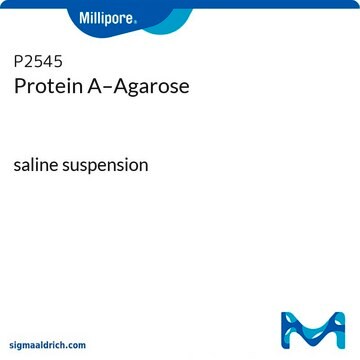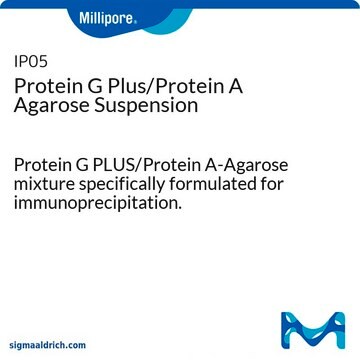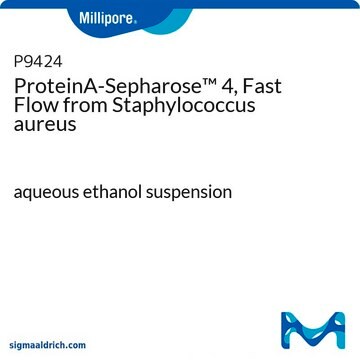IP02
Protein A Agarose Suspension
Protein A Agarose Suspension designed for immunoprecipitation applications
Sign Into View Organizational & Contract Pricing
All Photos(1)
About This Item
UNSPSC Code:
41116133
NACRES:
NA.56
Recommended Products
form
slurry (Liquid)
contains
≤0.1% sodium azide as preservative
manufacturer/tradename
Calbiochem®
storage condition
do not freeze
shipped in
wet ice
storage temp.
2-8°C
General description
Designed for immunoprecipitation applications. This product is blocked with BSA to reduce non-specific binding and cannot be used for purification; best for mouse IgG2a and IgG2b and rabbit IgG.
Protein A conjugated to agarose.
Warning
Toxicity: Standard Handling (A)
Physical form
In PBS.
Other Notes
Agarose solutions are supplied ready-to-use for immunoprecipitation. Use 15 µl suspension/µg primary antibody. Protein A-Agarose is recommended for use in immunoprecipitation assays using rabbit polyclonal antibodies or unmodified mouse IgG2a or IgG2b monoclonal antibodies. Mouse IgG1 or IgG3 and all rat antibodies bind poorly to Protein A. As an alternative, use Protein G PLUS, Protein G PLUS/Protein A, or rabbit second-step antibodies to bridge these antibodies to Protein A. Preclearing will minimize extra bands resulting from nonspecific precipitation. To preclear, add to the sample 20 µl of agarose conjugate and 1 µg of normal IgG from the same species as the immunoprecipitating antibody. When immunoblotting is used for detection, some secondary antibodies can react nonspecifically with BSA or other proteins present at high concentrations in the sample. This can be eliminated by reducing the concentration of secondary antibody.
Legal Information
CALBIOCHEM is a registered trademark of Merck KGaA, Darmstadt, Germany
Storage Class Code
11 - Combustible Solids
WGK
WGK 1
Flash Point(F)
Not applicable
Flash Point(C)
Not applicable
Certificates of Analysis (COA)
Search for Certificates of Analysis (COA) by entering the products Lot/Batch Number. Lot and Batch Numbers can be found on a product’s label following the words ‘Lot’ or ‘Batch’.
Already Own This Product?
Find documentation for the products that you have recently purchased in the Document Library.
Customers Also Viewed
Jonah Beenstock et al.
Molecular and cellular biology, 36(10), 1540-1554 (2016-03-16)
Many enzymes are self-regulated and can either inhibit or enhance their own catalytic activity. Enzymes that do both are extremely rare. Many protein kinases autoactivate by autophosphorylating specific sites at their activation loop and are inactivated by phosphatases. Although mitogen-activated
Maria-Eleni Lalioti et al.
Journal of cell science, 132(11) (2019-04-28)
A distinct combination of transcription factors elicits the acquisition of a specific fate and the initiation of a differentiation program. Multiciliated cells (MCCs) are a specialized type of epithelial cells that possess dozens of motile cilia on their apical surface.
Derek W Stouth et al.
American journal of physiology. Cell physiology, 314(2), C177-C190 (2017-11-03)
Protein arginine methyltransferase 1 (PRMT1), PRMT4, and PRMT5 catalyze the methylation of arginine residues on target proteins. Previous work suggests that these enzymes regulate skeletal muscle plasticity. However, the function of PRMTs during disuse-induced muscle remodeling is unknown. The purpose
Adrián Sanz-Moreno et al.
Breast cancer research : BCR, 23(1), 42-42 (2021-04-01)
Around 15-20% of primary breast cancers are characterized by HER2 protein overexpression and/or HER2 gene amplification. Despite the successful development of anti-HER2 drugs, intrinsic and acquired resistance represents a major hurdle. This study was performed to analyze the RANK pathway
Ajay Bhargava et al.
eLife, 5 (2016-02-18)
The Reproducibility Project: Cancer Biology seeks to address growing concerns about reproducibility in scientific research by conducting replications of selected experiments from a number of high-profile papers in the field of cancer biology. The papers, which were published between 2010
Our team of scientists has experience in all areas of research including Life Science, Material Science, Chemical Synthesis, Chromatography, Analytical and many others.
Contact Technical Service


